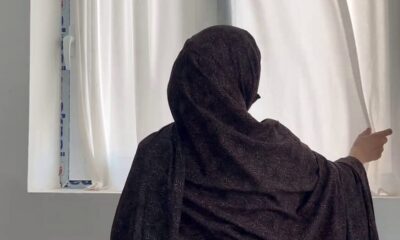Latest News
Israeli police attack worshippers in Jerusalem’s Al Aqsa, Gaza launches rockets at Israel
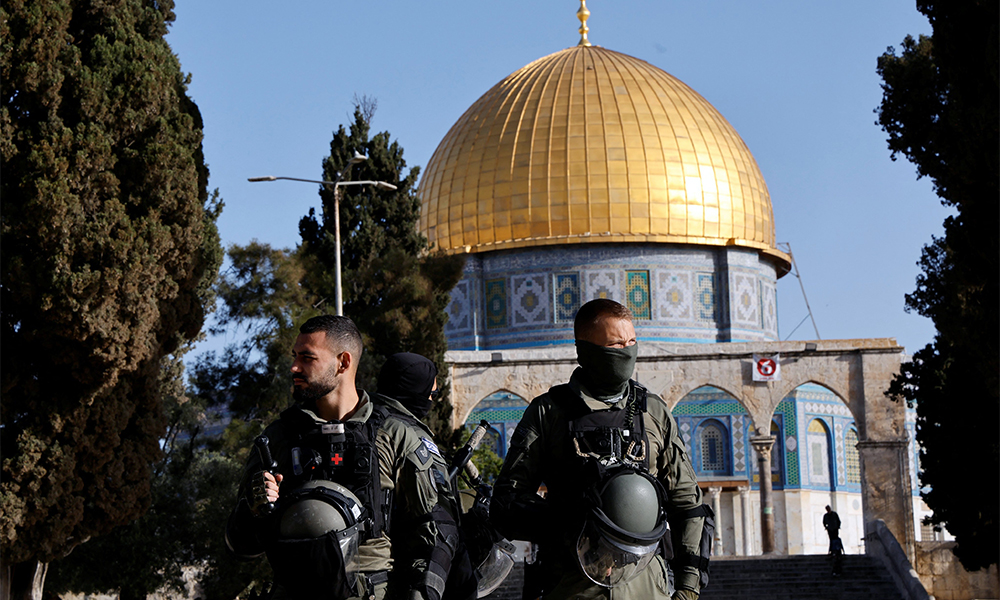
Israeli police entered Jerusalem’s Al-Aqsa mosque before dawn on Wednesday and clashed with worshippers, setting off a furious reaction from Palestinians across the occupied West Bank and crossborder strikes in Gaza, Reuters reported.
The incident, during the Muslim holy month of Ramadan and on the eve of the Jewish Passover, came amid fears that tensions built up during a year of escalating violence could be unleashed at the Al-Aqsa mosque, where clashes in 2021 set off a 10-day war with Gaza.
At least nine rockets were fired from Gaza overnight, prompting air strikes from Israel which struck what it said were Hamas weapon production sites, setting off ground-shaking explosions heard across the blockaded coastal strip.
Witnesses said Israeli tanks also shelled Hamas positions along the border fence in the southern part of the Gaza strip.
As day broke, the situation appeared to have calmed but the Palestinian Red Crescent said 12 Palestinians had sustained wounds, including from rubber-tipped bullets and beatings, in clashes with Israeli police. It added that Israeli forces were preventing its medics from reaching the area, read the report.
“In the yard to the eastern part of the compound, the police fired tear gas and stun grenades, it was a scene that I can’t describe,” said Fahmi Abbas, a worshipper at the mosque. “Then they stormed in and started beating everyone. They detained people and put the young men face down on the ground while they continued beating them.”
Videos circulating on social media, which Reuters could not independently verify, showed fireworks going off and police beating people inside one of the mosque buildings. Police video showed police entering the building while fire crackers exploded in the darkness, Reuters reported.
Israeli police said in a statement that security units were forced to enter the compound after what it called masked agitators locked themselves inside the mosque with fireworks, sticks and stones.
“Following many continuous attempts to remove the individuals from the mosque using dialogue failed, police were forced to enter the compound in order to remove the individuals,” the police said.
“Throughout the presence of police forces in the compound, stones were thrown and multiple firecrackers were set off inside the mosque by many law-breaking individuals and rioters,” the police statement said, adding that two police officers were wounded.
It said police arrested and removed more than 350 people who had barricaded themselves inside. “The police did a good job,” the hardline National Security Minister Itamar Ben-Gvir said in a statement.
Thousands of worshippers spent the night in the mosque compound, amid fears of possible clashes with Jewish visitors to the site, which they revere as the Temple Mount, the site of Judaism’s two ancient Temples.
Under the longstanding “status quo” arrangement governing the area, which Israel says it maintains, non-Muslims can visit but only Muslims are allowed to worship in the mosque compound. Jewish visitors have increasingly prayed more or less openly at the site in defiance of the rules.
The Waqf, the Jordanian-appointed organisation that manages the complex, considered the third holiest site in the Muslim world, described the police actions as a “flagrant assault on the identity and the function of the mosque as a place of worship for Muslims alone”.
The incident drew a sharp reaction from Arab countries. Jordan and Egypt, both involved in recent U.S.-backed efforts to de-escalate tensions between Israel and the Palestinians, issued separate statements strongly condemning the incident, while Saudi Arabia, with whom Israel hopes to normalise ties, said Israel’s “storming” of Al-Aqsa undermined peace efforts, Reuters reported.
Hazem Qassem, a spokesperson for Hamas, the Islamist group that controls Gaza, said the overnight rocket fire was a response to the police raid in the Al-Aqsa mosque and showed Israel would not be able to separate Gaza from the West Bank.
“The Zionist bombardment on Gaza was a failed attempt to prevent Gaza from continuing its support to our people in Jerusalem and the West Bank by all means,” Qassem said.
However neither Hamas, nor the Iranian-backed Islamic Jihad movement, claimed responsibility for the attacks, which were instead claimed by the smaller Democratic Front for the Liberation of Palestine and the Popular Resistance Committee. The Israeli military says it holds Hamas responsible for all attacks from Gaza.
The Palestinian Authority leadership condemned what it called Israel’s attacks on worshippers, which it described as a crime, read the report.
“We warn the occupation against crossing red lines at holy sites, which will lead to a big explosion,” said Nabil Abu Rudeineh, spokesperson for Palestinian President Mahmoud Abbas.
In the West Bank town of Beit Ummar, protestors burned tyres and threw rocks and explosive devices at Israeli soldiers, one of whom was shot and wounded.
With Israel still reeling from weeks of domestic tension over Prime Minister Benjamin Netanyahu’s bitterly contested plans to rein in the powers of the Supreme Court, the incident added to an already fevered political atmosphere, read the report.
Over the past year, Israeli forces have made thousands of arrests in the West Bank and killed more than 250 Palestinians, while more than 40 Israelis and three Ukrainians have died in Palestinian attacks.
Israel captured East Jerusalem, including the Old City where the Al-Aqsa Mosque compound is located, in a 1967 war and later annexed it in a move not recognised internationally. It regards Jerusalem as its eternal and indivisible capital, Reuters reported.
Palestinians want East Jerusalem for the capital of an independent state they seek in the West Bank and Gaza.
Latest News
Ministries of Public Health and Higher Education sign cooperation agreement
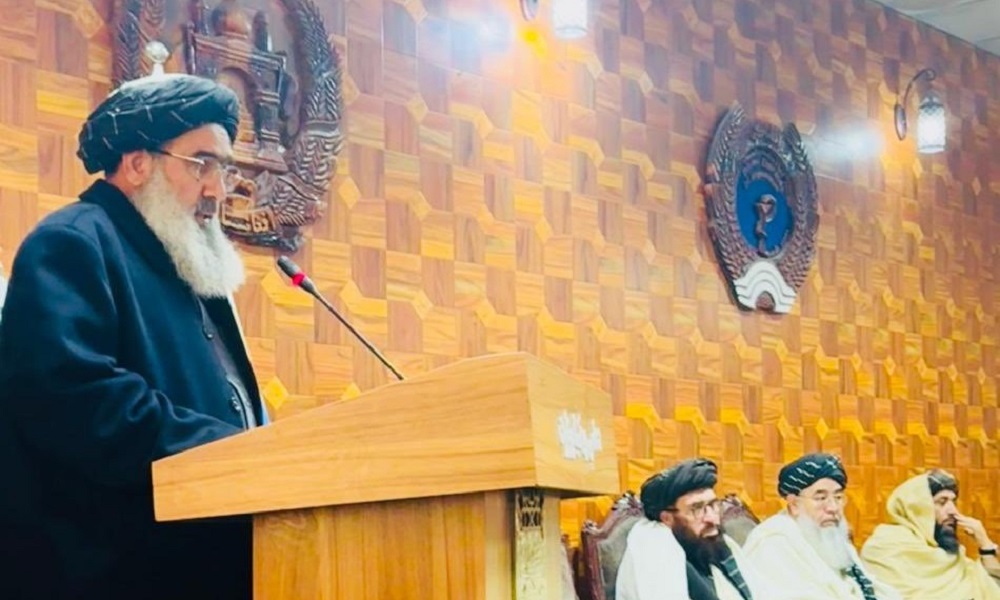
The Ministry of Public Health announced on Tuesday it has signed a cooperation agreement with the Ministry of Higher Education aimed at expanding scientific, research, educational, and technical cooperation.
At the signing ceremony held in Kabul, Noor Jalal Jalali, Minister of Public Health, said that the agreement would lead to significant improvements in the capacity-building of students and doctors, ensure that research is conducted based on evidence, and enable the collection of accurate data.
Meanwhile, Neda Mohammad Nadeem, Minister of Higher Education, described the agreement as beneficial to the public and to both institutions, stressing the need to train individuals at universities who can contribute to social development and make the country self-sufficient in the public health sector.
Latest News
UNAMA holds new round of Working Group meetings on counter-narcotics and private sector
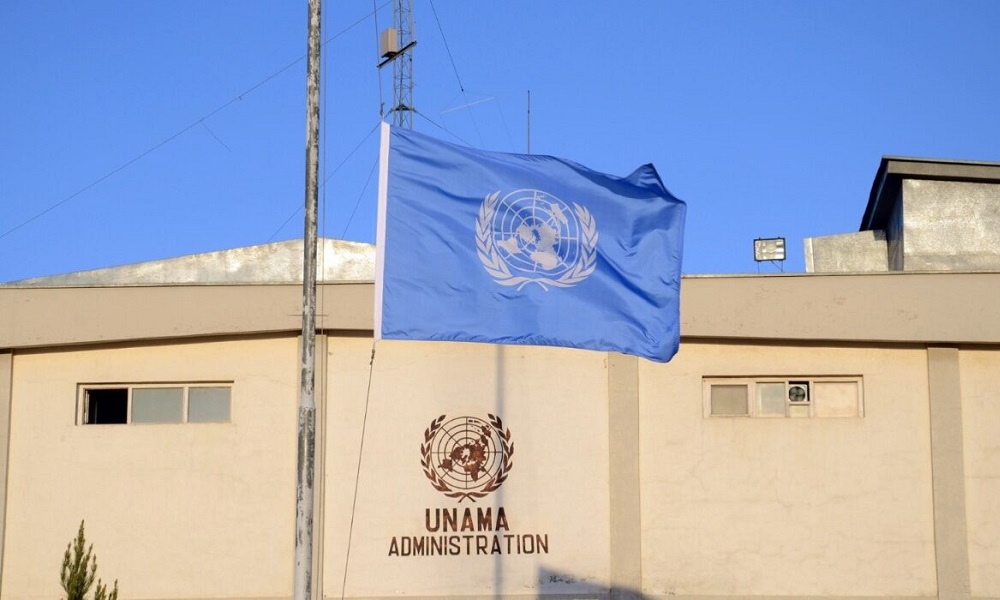
The United Nations Assistance Mission in Afghanistan (UNAMA) has convened a new round of Doha Process Working Group meetings focusing on counter-narcotics and private sector development.
The meetings, held in Kabul on February 3 and 9, brought together representatives of UN member states and international organizations, officials of the Islamic Emirate, and subject-matter experts.
According to UNAMA, discussions in the counter-narcotics working group centered on efforts by Islamic Emirate authorities and the international community to support alternative livelihoods for Afghans previously dependent on poppy cultivation and the illicit opium trade. Participants also reviewed drug-use prevention and treatment initiatives, as well as law-enforcement measures to curb narcotics production and trafficking.
The private sector working group focused on job creation and entrepreneurship, with particular attention to women’s participation in the private sector, market integration, access to finance, and the development of private banking and financial infrastructure.
UNAMA said both working groups identified priority areas for enhanced engagement and explored more effective and sustainable approaches to supporting Afghan men and women. Participants also examined the linkages between the two areas, noting that private sector development is a key source of livelihoods, while counter-narcotics efforts contribute to Afghanistan’s economic and social stability.
The working groups were established following the third Meeting of Special Envoys held in Doha, Qatar, in June and July 2024, in line with recommendations of the Independent Assessment endorsed by the UN Security Council. The process aims to promote more coherent, coordinated, and structured engagement with Afghanistan’s de facto authorities for the benefit of the Afghan people.
UNAMA added that stakeholders engage in the working groups on an ongoing basis, with full-format meetings convened periodically. Since their establishment, the groups have improved information-sharing, helped mobilize additional resources, and facilitated expert exchanges to strengthen support for the Afghan people.
Latest News
Economic Commission approves national policy for development of agriculture

At a regular meeting of the Economic Commission chaired by Mullah Abdul Ghani Baradar, Deputy Prime Minister for Economic Affairs, the National Policy for the Development of the Agriculture and Livestock Sector was approved.
According to a statement from the deputy PM’s office, the key objectives of the policy include the mechanization of the agriculture and livestock sector; development of agricultural, irrigation, and livestock research and extension systems; management of irrigation systems; support for investment in these sectors; and ensuring public access to high-quality agricultural and animal products.
During the same meeting, the development plan for the fish farming sector was also approved.
Under this plan, through private sector investment, 7,700 small, medium, and large fish production and farming facilities will be established on 6,500 hectares of land in various parts of the country.
The statement added that the implementation of this plan will create direct employment opportunities for 50,000 people and indirect employment for 250,000 others.
-

 Latest News3 days ago
Latest News3 days agoAfghanistan to grant one- to ten-year residency to foreign investors
-

 Sport4 days ago
Sport4 days agoIndonesia shock Japan to reach historic AFC Futsal Asian Cup final
-

 Sport3 days ago
Sport3 days agoIran clinch AFC Futsal Asian Cup 2026 in penalty shootout thriller
-

 Latest News3 days ago
Latest News3 days agoAfghanistan says Pakistan is shifting blame for its own security failures
-

 International Sports2 days ago
International Sports2 days agoWinter Olympics gain momentum as medal table takes shape
-

 Latest News3 days ago
Latest News3 days agoTraffic police receive new cars
-
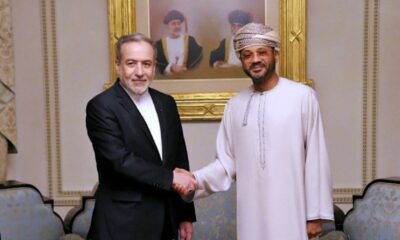
 Regional4 days ago
Regional4 days agoIran’s FM calls Oman-mediated talks with US ‘good start’
-
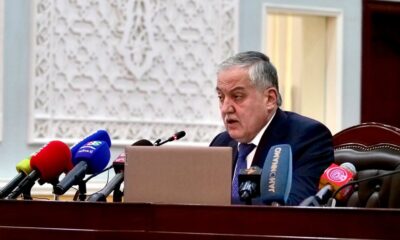
 Latest News2 days ago
Latest News2 days agoTajik foreign minister urges international community to help Afghanistan address its challenges








